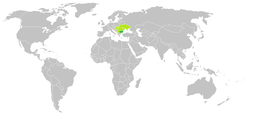Idioma búlgaru
| български език | |||||||||||
|---|---|---|---|---|---|---|---|---|---|---|---|
| Faláu en | |||||||||||
| Faláu en | Bulgaria, Macedonia del Norte, Ucraína, Serbia, Rumanía, Grecia, Turquía, Moldavia, Albania y Rusia | ||||||||||
| Númberu de falantes | |||||||||||
| |||||||||||
| Datos | |||||||||||
| Familia | idiomes eslavos meridionales | ||||||||||
| Sistema d'escritura |
alfabeto búlgaro (es) | ||||||||||
| Reguláu por |
Institute for Bulgarian Language (es) | ||||||||||
| Códigos | |||||||||||
| ISO 639-1 | bg | ||||||||||
| ISO 639-2 | bul | ||||||||||
| ISO 639-3 | bul | ||||||||||
 | |||||||||||
El búlgaru (български език [ˈbɤ̞lɡɐrski ɛˈzik]) ye un idioma indoeuropéu de la rama eslava faláu en Bulgaria y en delles partes de Serbia, Moldavia y Ucraína por unos 9 millones de persones. En Macedonia del Norte fálase un dialeutu occidental del búlgaru.
Forma parte col serbocroata y eslovenu del grupu de llingües eslaves meridionales. El búlgaru antiguu yera y aínda ye la llingua oficial de la Ilesia Ortodoxa.
Emplega l'alfabetu cirílicu.
Historia de la llingua
[editar | editar la fonte]El desendolcu históricu del búlgaru pue dividise en dellos periodos:
- Prehistóricu: protoeslavu. Duró fasta'l 860. Ye'l tiempu de les invasiones eslaves y de la misión de San Cirilu y San Metodiu.
- Búlgaru antiguu (sieglos IX-XI): antiguu eslavu eclesiásticu. Los escolinos de los dos santos ortodoxos tornen la Biblia al eslavu.
- Búlgaru mediu (sieglos XII-XV).
- Búlgaru modernu (sieglos XVI-XIX).
- Búlgaru actual.
El desendolcu del búlgaru carauterízase pola transición d'una llingua sintética a una analítica.
Fonética y fonoloxía
[editar | editar la fonte]Les vocales:
| Alfabetu | IPA | X-SAMPA | Descripción | Asemeyanza cola pronuncia asturlleonesa |
|---|---|---|---|---|
| и | [i] | [i] | frontal zarráu non redondeáu | máquIna |
| е | [ɛ] | [E] | frontal medio-abiertu non redondeáu | pEnte |
| а | [a] | [a] | central abiertu non redondeáu | pÁ |
| ъ | [ɤ̞] | [@] | central medio-posterior non redondeáu | interpretE |
| у | [u] | [u] | posterior zarráu redondeáu | mantU |
| о | [ɔ] | [o] | posterior medio-abiertu redondeáu | Onde |
Les consonantes:
| Alfabetu cirílicu | IPA | X-SAMPA | Descripción | Asemeyanza cola pronuncia asturlleonesa |
|---|---|---|---|---|
| б | [b] | [b] | bilabial plosiva | Blancu |
| бьо/бю/бя | [bʲ] | [b'] | bilabial plosiva | Biacu |
| в | [v] | [v] | llabiodental fricativa | aVó (portugués) |
| вьо/вю/вя | [vʲ] | [v'] | llabiodental fricativa | aviar (portugués) |
| г | [g] | [g] | sonora velar oclusiva | Galera |
| гьо/гю/гя | [gʲ] | [g’] | palatal oclusiva | aGua |
| д | [d] | [d] | alveolar oclusiva | Día |
| дьо/дю/дя | [dʲ] | [d'] | sonora postalveolar oclusiva | Dio |
| ж | [ʒ] | [Z] | postalveolar fricativa | Janela (portugués) |
| дж | [ʤ] | [dZ] | postalveolar africada | Jack (inglés) |
| з | [z] | [z] | alveolar fricativa | caSa (portugués) |
| зьо/зю/зя | [zʲ] | [z’] | alveolar fricativa | as you (inglés) |
| к | [k] | [k] | velar plosiva | Casa |
| кьо/кю/кя | [kʲ] | [k’] | palatal oclusiva | QUién |
| л | [l] | [l] | alveolar aproximante | aLó (portugués) |
| льо/лю/ля | [ʎ] | [L] | palatal lateral aproximante | volume (inglés) |
| м | [m] | [m] | billabial nasal | Mano |
| мьо/мю/мя | [mʲ] | [m'] | billabial nasal | Mieu |
| н | [n] | [n] | alveolar nasal | eNantes |
| ньо/ню/ня | [ɲ] | [J] | palatal nasal | caÑón |
| п | [p] | [p] | billabial oclusiva | Parque |
| пьо/пю/пя | [pʲ] | [p'] | billabial oclusiva | PIoyu |
| р | [r] | [r] | alveolar vibrante | caRRu |
| рьо/рю/ря | [rʲ] | [r'] | palatal vibrante | Riestra |
| с | [s] | [s] | alveolar fricativa | caSa |
| сьо/сю/ся | [sʲ] | [s’] | alveolar fricativa | quioscu |
| т | [t] | [t] | alveolar oclusiva | Techu |
| тьо/ тю/ тя | [tʲ] | [t'] | postalveolar oclusiva | Tiesta |
| ф | [f] | [f] | llabiodental fricativa | Falar |
| фьо/фю/фя | [fʲ] | [f'] | sorda palatal labiodental fricativa | caFiante |
| х | [x] | [x] | velar fricativa | guaḤe; caJa (español) |
| ц | [ʦ] | [ts] | alveolar africada | tsunami; nueTSe (nes Brañes altes) |
| цьо/цю/ця | [ʦʲ] | [ts’] | alveolar africada | cuTSIellu (nes Brañes altes) |
| ч | [ʧ] | [tS] | postalveolar africada | CHina |
| ш | [ʃ] | [S] | postalveolar fricativa | paisaXe |
Frases corrientes
[editar | editar la fonte]- Здравей (zdravei) — hola
- Здрасти (zdrasti) — hola (informal)
- Добро утро (dobro utro) — bonos díes
- Добър ден (dober den) — un bon día
- Добър вечер (dober vecher) — bones tardes
- Лека нощ (leka nosht) — bones nueches
- Довиждане (dovijdane) — adiós
- Как си (kak si) — ¿cómo tas?
- Добре съм (dobre sum) — toi bien
- Поздрави (pozdravi) — saludos
- Благодаря (blagodarya) — gracies
Referencies
[editar | editar la fonte]Enllaces esternos
[editar | editar la fonte] Consulta la edición de Wikipedia n'idioma búlgaru.
Consulta la edición de Wikipedia n'idioma búlgaru.- Historia de la llingua búlgara Archiváu 2019-06-29 en Wayback Machine
Text is available under the CC BY-SA 4.0 license; additional terms may apply.
Images, videos and audio are available under their respective licenses.
